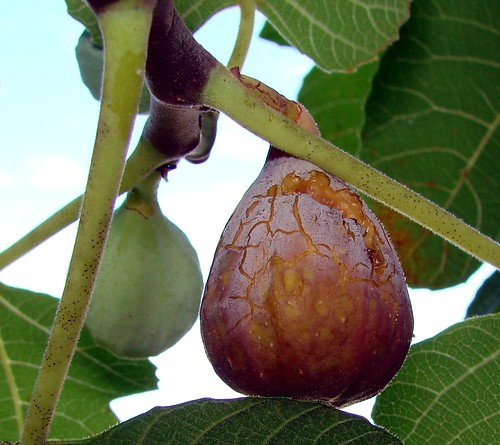Figs on a fig tree, one green, one dead ripe
It recently occurred to me that figs are mentioned in the Bible in a number of places, and in a number of ways. I am listing some of them, with annotation, in this post.
The first mention, of course, is that Adam and Eve are said to have made themselves garments of fig leaves, after the Fall, in Genesis 3:7.
In Numbers 13:23, the twelve spies, including Caleb and Joshua, brought back figs as part of their evidence that the land of Israel was fruitful.
Abigail pacified David's righteous anger with a gift of food, including figs.
I Kings 4:25 uses the idea of people sitting under their vine and fig tree as a way to describe peace. So do other passages. Jeremiah uses the loss of the fig harvest as a way to emphasize what enemies would do. In another passage, he uses a lack of a fig harvest as a way to describe spiritual poverty. Jeremiah, in chapter 24, uses spoiled versus good figs as a way to describe God's salvation, and also punishment, of the Israelites.
Isaiah used a cake of dried figs as a cure for a medical problem to heal someone. Isaiah also used leaves falling from a fig tree as a way of describing the end times.
Hosea uses the first harvest of figs from a planting to describe the former spiritual loyalty of the people of Israel.
In his prophecy of the locusts coming on Israel, Joel mentions damage to the figs as one of the kinds of destruction that is coming on them.
In Habakkuk 3, one of the great chapters in the Bible, the prophet says:
17 Though the fig tree should not blossom,
nor fruit be on the vines,
the produce of the olive fail
and the fields yield no food,
the flock be cut off from the fold
and there be no herd in the stalls,
18 yet I will rejoice in the Lord;
I will take joy in the God of my salvation.
19a God, the Lord, is my strength;
he makes my feet like the deer's;
he makes me tread on my high places.
In Matthew 7:16, Jesus says that we shall know people's loyalty to Him by the fruit they produce. Thistles, he says, don't give us figs. Later, James presents the same idea.
In Matthew 21, Jesus demonstrates his authority and God-hood by causing a fig tree to wither and die.
In Matthew 24, Jesus tells the disciples about the end times, and uses the sequence of events in fig tree seasonal growth to illustrate that there will be signs of these events.
One of the parables in Luke 13 tells about how God gives people a chance to follow Him, but, if they don't, they will be destroyed like an unfruitful fig tree would be.
In John 1, Jesus tells Nathanael that he saw him before they met, when Nathanael was under his fig tree.
Lastly, in Revelation, the stars are said to fall, like ripe figs fall from tree in the wind.
So figs are mentioned quite a bit in the Bible. So are grapes, and other crops. Maybe I'll consider them later.
Thanks for reading!



7 comments:
Thank you for the information - I have wondered about figs also, so I appreciate your research! God bless as you continue searching the scriptures....
Don't forget Amos!
“I struck you with blight and mildew; your many gardens and your vineyards, your fig trees and your olive trees the locust devoured; yet you did not return to me,” declares the LORD. (Amos 4:9)
Then Amos answered and said to Amaziah, “I was no prophet, nor a prophet’s son, but I was a herdsman and a dresser of sycamore figs. (Amos 7:14)
You are right. Thanks, Frank!
Thanks I am writing a paper for school and this helps guide my research! god bless!
Glad to be of help, Anonymous.
I love this. Now how about apples?
I may try that. Thanks for your comment, valeri.
Post a Comment